
Director

Director
Praised by critics as “magnificent”, “breathtakingly theatrical” and full of “zestful imagination”, Melly Still’s “spine-tingling” Rusalka is a Glyndebourne classic – a magical contemporary reimagining of a much-loved fairy tale. Light and darkness, beauty and danger come together in this passionate tale of love against the odds. At once evocative and unsettling, this production collides two contrasting worlds in Rae Smith’s elegant designs made of “brilliant stage-pictures”. Rusalka’s forest home is a dappled space of sunshine and shadows, full of strange woodland creatures, while the Prince’s court is a world of sleek modernity and sophistication – a world of man.

Author

Director

Director
This is Laurent Pelly’s Théâtre des Champs-Élysées staging of Rossini’s Il barbiere di Siviglia, with a cast featuring Florian Sempey as Figaro, Catherine Trottmann as Rosina, and Michele Angelini as Il Conte Almaviva. Jérémie Rhorer conducts Le Cercle de l-Harmonie.

Conductor
Amour, the messenger of the gods, tells Orpheus that he may descend to the underworld and return with Eurydice. His singing has the power to appease the Furies and animate the blessed Shadows. Yet, his voice cannot reassure Eurydice who despairs of the feigned indifference of Orpheus, put to the test by Jupiter. Raphaël Pichon conducts the opera of operas and Aurélien Bory displays the giddiness of the mental and supernatural spaces traveled by Orpheus and beyond. Marianne Crebassa plays a new breeches role with Hélène Guilmette (Hélène in Le Timbre d’argent) and Lea Desandre (the title role in Alcione).

Director
Amour, the messenger of the gods, tells Orpheus that he may descend to the underworld and return with Eurydice. His singing has the power to appease the Furies and animate the blessed Shadows. Yet, his voice cannot reassure Eurydice who despairs of the feigned indifference of Orpheus, put to the test by Jupiter. Raphaël Pichon conducts the opera of operas and Aurélien Bory displays the giddiness of the mental and supernatural spaces traveled by Orpheus and beyond. Marianne Crebassa plays a new breeches role with Hélène Guilmette (Hélène in Le Timbre d’argent) and Lea Desandre (the title role in Alcione).

Director
Britten's last opera, in two acts, presented by Teatro Real.

Director
Elizabeth of Valois is promised in marriage to Don Carlos of Spain, as part of a peace treaty between the two kingdoms. They meet and fall in love – but no sooner have they declared their love than news comes that the terms of the treaty have changed: Elizabeth is to marry Carlos’s father Philip instead. Politics and religion are dangerously entwined in Giuseppe Verdi’s Don Carlo. Performed on November 30th, 2016, at the Opéra national du Rhin, Strasbourg.
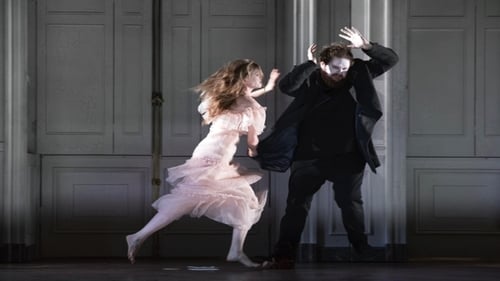
Director
Brett Dean's multi-award-winning opera received its world premiere at Glyndebourne Festival 2017. The world premiere recording of Brett Deans new opera based on Shakespeares best-known tragedy: To be, or not to be. This is Hamlets dilemma, and the essence of Shakespeares most famous and arguably greatest work, given new life in operatic form in this original Glyndebourne commission. Thoughts of murder and revenge drive Hamlet when he learns that it was his uncle Claudius who killed his father, the King of Denmark, then seized his fathers crown and wife. But Hamlets vengeance vies with the question: is suicide a morally valid deed in an unbearably painful world?
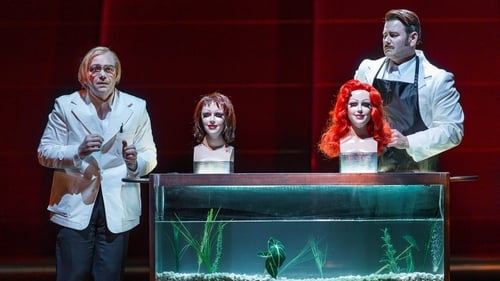
Director
Based on real events and drawing on Georg Büchner's revolutionary play, Alban Berg's Wozzeck turns a grimly tragic narrative of violence and murder into one of the most powerful and original operas of the 20th century. Berg's uncompromising portrayal of brutality and madness generated much controversy, but the significance of Wozzeck was soon recognised; its compelling lyrical expansiveness, large-scale dramatic gestures and remarkable musical structures producing music of overwhelming emotional intensity. The Financial Times declared this to be 'a beautiful, moving, engrossing production… this is a consummate Wozzeck, blending clarity, lyricism, compassion and crushing force.'

Director
Glyndebourne's Saul stole the summer and had critics raving. The Guardian (****) applauded virtuoso stagecraft from director Barrie Kosky in his debut production there, calling the show a theatrical and musical feast of energetic choruses, surreal choreography and gorgeous singing. For The Independent, which ranked it amongst five top classical and opera performances of 2015, there was no praise too high for the cast. The Orchestra of the Age of Enlightenment under Ivor Bolton sparkles from the pit with period panache, and designer Katrin Lea Tag's exuberant costumes (The Times ****) set the Old Testament story in Handel's time, with a witty twinge of the contemporary.

Director
Glyndebourne has brought to light a long-overlooked winner in Donizetti's Poliuto, delivering a superb musical performance (The Telegraph) offering lucent accounts of the principal roles and an incandescent London Philharmonic Orchestra, under Enrique Mazzola (New York Times). This first-ever professional UK staging of the story of third-century Armenian martyr St Polyeuctus features a trio of world-class young singers with Beverly Sills- and Richard Tucker-award-winning Fabiano displaying a thrilling, vibrant tone in the title role, Martínez providing Paolina with pinging coloratura and Golovatenko giving a radiant-toned voice to Severo (The Guardian )
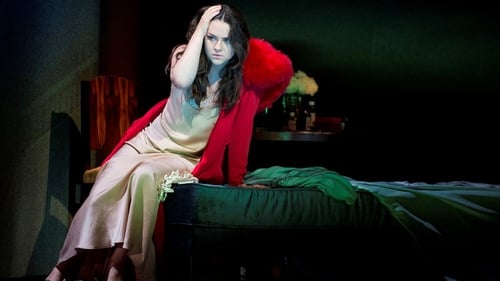
Director
Alfredo, a young man from the provinces, falls in love with Violetta, the stylish toast of Paris. But she’s not the marrying kind – at least not until now. However, their dreams are threatened by both a merciless society that condemns Violetta’s racy past and an equally merciless disease. Russian soprano Venera Gimadieva portrays the iconic role of Violetta, alongside American tenor Michael Fabiano as Alfredo. The visual beauty of Tom Cairns’s opulent production aptly echoes the irresistible allure of this beloved opera.

Director
New production. Live from Glyndebourne 2015.

Director

Director
Perhaps no opera is as closely and affectionately associated with a single opera house as Le Nozze di Figaro is with Glyndebourne. Michael Grandage's staging is no less than the seventh in the festival's history, and sets the opera in the sleazy Sixties. Directed by Robin Ticciati, the production was lauded for its "ideal pacing" and youthful cast (which includes "no weak link" and "looks gorgeous"—The Sunday Times), and continues Glyndebourne's rewarding explorations of Mozart and Da Ponte's "day of madness".

Director
After the destruction of Troy, the Trojan warrior Énée sets out on a journey to found a new dynasty. He meets Didon, Queen of Carthage, and falls in love. But will Énée's love for Didon prove stronger than his sense of duty? LES TROYENS ('The Trojans') is a tour de force of music that ranges from fiery military marches to intense choruses, passionate soliloquies – such as those of the prophetess Cassandre – and the lyrical love duets of Didon and Énée. It is Hector Berlioz's largest work and he wrote the libretto himself, drawing upon his intimate knowledge of Virgil's Aeneid. To the composer's disappointment, LES TROYENS was only performed once in full during his lifetime and was often presented in shortened form during the 20th century. The Royal Opera's production provides a rare chance to see this epic work in its entirety. David McVicar's staging is on an enormous scale, assembling one of the largest casts ever seen at Covent Garden.

Director
Live recording at Opéra-Bastille in 2012.
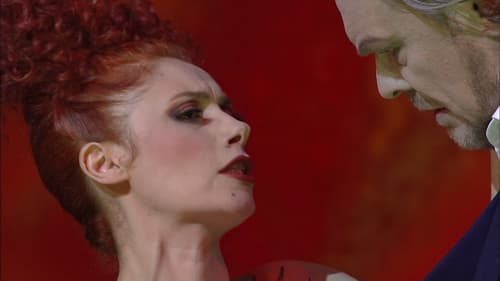
Director
La ópera Lulu, escrita por A. Berg, quedó inconclusa - su tercer acto no fue completado por el compositor. Un fragmento se representó por primera vez el 2 de junio de 1937 en la Ópera de Zúrich. La ópera fue completada por el compositor austriaco contemporáneo F. Cerchoi, que terminó el tercer acto, y su versión completa se estrenó en la Ópera de París el 24 de febrero de 1979, dirigida por Pierre Boulez (con Teresa Stratas en el papel principal).
La ópera se basó en las tragedias del escritor alemán Frank Wedekind "Earthly Spirit" y "Pandora's Box". A. Berg logró reelaborar estos dramas de tal manera que conservó el texto original de las réplicas de los héroes de Wedekind en 3 actos de su ópera. La ópera describe el auge social de una mujer joven en la sociedad burguesa, que termina con el asesinato de su amado hombre y la caída posterior cuando ella, después de haberse convertido en una prostituta, muere a manos de su último amante.

Producer
Captain Vere, an old man, is haunted by a moment in his life when he was tested and found wanting. Based on Herman Melville's novella of naval life in the late 18th Century, Benjamin Britten's 'Billy Budd' is a gripping reflection on good and evil, innocence and corruption.

Director
Live performance 10 February 2011 at the Palais Garnier. Emmanuelle Haïm conducting Le Concert d'Astrée and les Choeurs de l'Opéra national de Paris. Directed for stage by Laurent Pelly.

Director
In 2009, Frédéric Mistral’s tale of love and loss in Provence came to the Opéra de Paris with a new production of Gounod’s 1864 opera Mireille. Nicolas Joel’s naturalistic staging frames the accomplished performances of Albanian soprano Inva Mula as Mireille and American tenor Charles Castronovo as her ardent country lover Vincent.

Director
About the Director: John Eliot Gardiner is one of the most versatile conductors of our time. Acknowledged as a key figure in the early music revival, he is the founder and artistic director of the Monteverdi Choir, the English Baroque Soloists and the Orchestre Révolutionnaire et Romantique. The extent of his repertoire is illustrated in over 250 recordings which have received numerous international awards. Over the years Gardiner has won more Gramophone awards than any other artist. Probably the most francophile of English conductors, John Eliot Gardiner returned to the Opéra Comique, Paris for a much aclaimed production of Carmen last year. On June 25th it was broadcast live to 50 theatres in France and Switzerland and also recorded for TV. This followed an exciting collaboration that began in December 2007 with Chabrier s Opera bouffe L'Etoile, which had opened the new theatre at Opera Comique in December 2007.
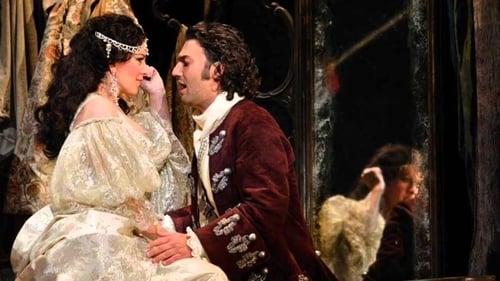
Director
Mark Elder leads the orchestra and chorus in a lavish performance . . . She certainly has the temperament to play Adriana, who can present herself as humble and sweet but, in a scene where she takes the stage, is nothing if not intense . . . this recording provides a reminder of how secure and uniquely attractive her singing can be. Her soprano glides effortlessly, its top still silvery, over the oft-excerpted arias "Io son l'umile ancella" and "Poveri fiori." There's a real core even in much of her soft singing, and the recording flatters her lower register. As Maurizio, Jonas Kaufmann has the ideal chiaroscuro sound to portray both poet and warrior. It's great to hear his robust tenor at full force . . . Olga Borodina makes for an imperious princess . . . Alessandro Corbelli employs luster and dignity.

Director
Live from Glyndebourne 2009

Director
The choreographer brings the Paris of yesteryear back to life: the city of the Boulevard du Crime from the first half of the 19th century, with its artists, theaters, and cabarets. In a staging reminiscent of a movie set, the mime Baptiste bathes in his memories, tell about his encounter with Garance, his impossible love for a marvelous yet unattainable woman, the magical universe of the stage, life behind the scenes, and the tenuous line performers maintain between reality and illusion. Marc-Oliver Dupin's original score provides the musical backdrop for a choreography alternating between larger ensemble numbers and intimate love duets.

Director
Live performance from Opéra National de Lyon.

Director
"Inspired by a fable by La Fontaine, [composer Jean-Philippe] Rameau produced perhaps his most brilliant music for his penultimate great work, blending reality and the surreal on several levels." — from the DVD back cover

Director
Live performance at the Théâtre du Châtelet in December 2004. Marc Minkowski conducting Les Musiciens du Louvre-Grenoble. Stage direction by Laurent Pelly.

Director
Live performance from the Opéra National de Paris, 2003.

Director
Renee Fleming stars in Dvorak's three-act opera based on two fairy-tales which tells the story of a water-nymph called Rusalka (Fleming), who wishes she was human, after falling in love with a mortal.

Director
Napoleon's tumultuous relations with Russia including his disastrous 1812 invasion serve as the backdrop for the tangled personal lives of two aristocratic families.

Director
Inspired by Goethe's early romantic play Clavigo, Roland Petit's ballet recounts the agonies of a weak-willed lover torn between the contradictory promptings of his heart and his evil spirit, which urges him to serve his own interests and forsake true love in favor of a life of debauchery. Recorded live at the Opera National de Paris, Palais Garnier, October 1999.

Director
L’Étoile did much to establish Chabrier as a major force on the Parisian stage and his contemporary Henri Duparc praised him specifically for creating a French comic genre, both funny and musical – described as something of a French Die Meistersinger. The fanciful story is set in an imaginary kingdom and all, naturally, ends well. However, despite the slight plot line L’Étoile is something of a pivotal work, a unique example of French 19th-century light opera, orchestrated with great sophistication and flooded with gossamer wit.

Film Processor
























